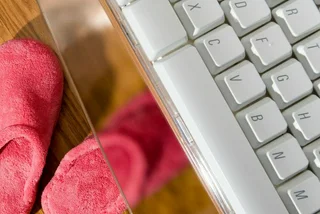While you may work in an international firm with co-workers from a mix of backgrounds and nationalities, you’re still likely to experience working with Czech colleagues and possibly superiors whose style of doing business may be different from your own. Here are some tips for keeping relations cordial — and professional — in a Czech office setting:
Ahoj/Hey, Tomáš.
Czechs, especially those you aren’t on a familiar basis with, stick to formalities and using informal greetings right off the bat is typically considered poor form. Whether you are speaking Czech or not it’s important to keep things formal (saying dobrý den or dobré ráno in the morning; na shledanou upon departure), and wait until your superior or colleagues invite you to address them on a first-name, informal basis (greeting Czech office support staff and older colleagues in the formal fashion is particularly recommended).
I’m not a morning person.
That may be so, but Czechs get into the office bright and early and punctuality, in other words being on time for work as well as noticeably early for meetings, is an essential requirement for success in a Czech office. If you roll in 5-10 minutes late every day you can be sure that your colleagues will take notice.
Looking for a job in Prague? Search 1000s of the latest vacancies at the Expats.cz Job Server
Let’s meet on Friday afternoon.
Let’s not! In the Czech Republic, a country known for its laid-back summer season (known as “cucumber season” or Okurková sezóna), which sees employees go on holiday en masse and no one picking up the phone after Friday lunchtime, the last day of the week is typically not the best time to schedule a meeting. And your boss or Czech co-workers will likely be heading out to the chata or for a hiking trip at week’s end, no matter what time of year it is.
I’ll just eat lunch at my desk.
Eating lunch at your desk is considered strange by Czechs especially when the large majority of the office, supervisors included, stop for a sit-down lunch before 12 pm. It’s polite to join in or at the very least take your lunch to the break room — and take an actual break.
Sniff, sniff, I’m not feeling well but I’ll be okay.
While many employees see some kind of misguided valor in muddling through work when they don’t feel great, in a Czech office doing so is a big don’t. Here doctors will write sick notes that mandate a week off work for a cold while bosses and co-workers alike appreciate it when coughing colleagues fully recover at home before returning to the office and spreading their illness.
Let’s have a quick meeting.
Sure, there are exceptions to this one, especially given the growing informality of corporate environments at international companies in Prague and the Czech Republic. But for the most part, your Czech boss will likely prefer an e-mail request or some sort of pre-planning before you show up at his or her office door. Following established procedures is of vital importance in Czech office culture.
I need a response — now.
When it comes to discussion and conflict you may find that you receive a lot of indirect answers instead of a definitive positive or negative response. If you’re expecting an outcome to be reached directly following a meeting you may be disappointed: Decisions are often delayed until after meetings due to the often-times systematic decision-making process in Czech offices.
Let’s discuss it over breakfast.
While the Creative Mornings concept and other business-breakfast networking events do exist in Prague, breakfast meetings aren’t that common and issuing an invitation to discuss business matters over eggs and toast may be seen by your boss or co-workers as a bit of Western eccentricity.
I’ll stay late to wrap this up.
In many company cultures, staying late and working ahead is seen as industrious and the sign of a devoted employee. In the Czech Republic, it could actually be seen as a sign that you are mismanaging your time. Czechs tend to compartmentalize work and home life, priding themselves on the work-life balance; which generally means leaving right around 5 pm at the end of day.
I hate beer.
In a country where beer is the beverage of choice any time of day, with 143 l consumed per person per year, it’s highly likely that you’ll be invited to raise a pint over lunch, at work functions, and, after your colleagues get to know you, at group outings to the pub. If you haven’t yet acquired a taste for a delicious, foamy pilsner, doing so might be a wise career move!













 Reading time: 4 minutes
Reading time: 4 minutes 






























